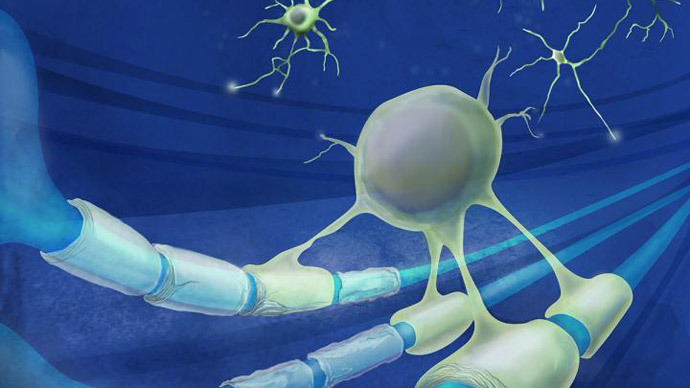Skin medicines could help to fight multiple sclerosis - study

Medicines used to help cure skin problems might prove to be vital in the fight against multiple sclerosis. US scientists have found that two drugs may promote the body’s own stem cells to replace brain cells, which are affected by the disease.
The two treatments are normally used to help cure eczema and
athlete’s foot. However, researchers at Case Western Reserve
laboratory found after tests on mice, the medicines helped to
stimulate brain cells. They published their findings in the
scientific journal Nature on Monday.
READ MORE: Think pink: Number of women with
breast cancer may double in next 15 years, study
finds
The research team used state-of-the-art microscopes to analyse
their findings, which they said helps to reverse the effect
multiple sclerosis (MS) has on the brain.
"We know that there are stem cells throughout the adult
nervous system that are capable of repairing the damage caused by
multiple sclerosis, but until now, we had no way to direct them
to act," co-author Paul Tesar said in a press release.
"Our approach was to find drugs that could catalyse the
body's own stem cells to replace the cells lost in multiple
sclerosis," Tesar added.
READ MORE: ‘Slow and insufficient’: WHO admits
failing to respond to Ebola crisis
The new findings could potentially help millions of MS suffers
around the world. The disease is the most common chronic
neurological disorder among young adults, the press release
added.
The disease is caused by the destruction of a protective coating,
called myelin, around nerve cells in the brain and the spinal
cord. Myelin is important as it surrounds and insulates the nerve
fibres.
Once a patient has contracted MS, the person develops physical
and mental problems, such as the ability to walk and memory loss.
Currently MS is considered to be incurable, and existing
therapies are only aimed at slowing down the debilitating
process.
READ MORE: Healthy caffeine: Study proves coffee
can ward off breast cancer
However, the Case Western Reserve team’s work suggests a brand
new approach. When new myelin is created within the nervous
system, the body is pushed “to resort to its ability to
repair itself”.
"To replace damaged cells, much of the stem cell field has
focused on direct transplantation of stem cell-derived tissues
for regenerative medicine, and that approach is likely to provide
enormous benefit down the road," said Tesar.
The US team say that a lot of work still needs to be carried out
before it can be seen as an effective cure in the battle against
MS. The researchers need to work out whether the product could be
viable in the long term or if it has any possible side effects.












